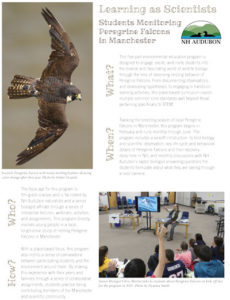Since 2006, this science education initiative at Beech Street Elementary School in Manchester has been supported by organizations like the TD Charitable Foundation, Kiwanis Club of Manchester, Queen City Rotary Club, Cogswell Benevolent Trust, Arthur Getz Trust, and the Horne Family Foundation. Each year we make the case to continue this science education program that the teachers, students, and families of Beech Street Elementary School have grown to love.
Thanks to generous funders, this science education program has increased second graders’ understanding and knowledge of ecological and biological concepts while applying this knowledge through exploration of field and forest habitats at our nature center in Auburn. Beech Street Elementary School is a multicultural school in Manchester representing, in the words of its principal, a “diverse educational community with approximately 600 students in grades K-5 that provides a challenging and global learning environment for all.” 93.1% of attending students participate in the Federal Lunch program. Many students are first generation American Families and 30.8% are Limited English Proficient.
Past programmatic grants have enabled NH Audubon to offer monthly science programs for about 125 second grade students at the Beech Street Elementary School each year since first piloting this longitudinal instruction in 2006. Teachers have told us these visits are often the only science instruction that students receive during the year. Like all second graders, they are excited to see common animals like squirrels, chipmunks, Blue Jays and Robins. We encourage those observations and positive experiences in nature throughout the year. In our ponding class, they discover and learn about the life cycle of aquatic insects, fish, and frogs. In a program evaluation, one teacher wrote:
“The majority of the children at Beech Street do not have the ability to spend time away from the city for various reasons (transportation, parent availability, money, etc.) so this program allows our students to be able to experience nature first-hand in our own school. The students are engaged and excited every time [the NH Audubon science educator] shows up. The students will continue to talk about the lessons and animals long after the hour-long class has finished. I have seen my students collect trash on their own after lessons on conservation with [the NH Audubon science educator].”
In the words of 2nd grade teacher Jeanne Branscombe, “I’d rate the program at a 10++. It is so valuable for our students and it is perfect for this grade level. So many of our students have never seen or learned about some of these animals.” Many of the students are able to touch and hold turtles and other animals for the first time.
If you are interested in providing this longitudinal and scaffolded program to your second-grade class, please contact an Education Coordinator to inquire about partnering on future grant opportunities.


